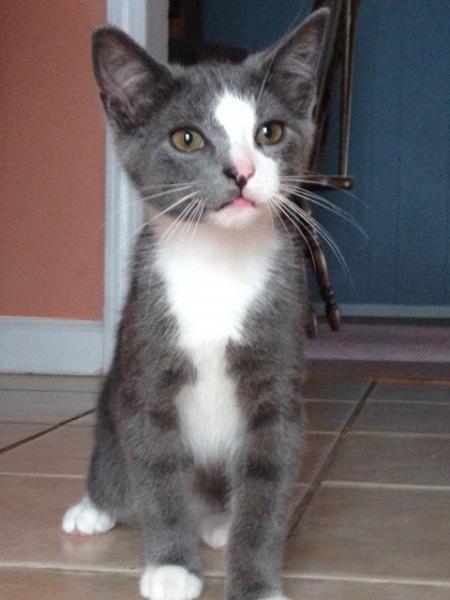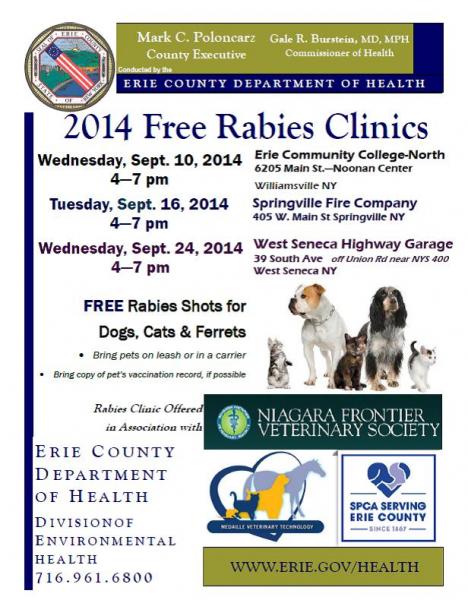
MEDIA RELEASE
From the Office of the Commissioner of Health, Dr. Gale R. Burstein
Date September 4, 2014
CONTACT: Mary C. St. Mary/Mary.StMary@Erie.Gov
Phone: 716.858.4941/ Mobile: 716.253.3925
3 Free Rabies Clinics in September
Second Rabid Cat in Erie County Enforces Need for Cats to be Vaccinated
ERIE COUNTY, NY— The Erie County Department of Health (“ECDOH”), in collaboration with the Niagara Frontier Veterinary Society, the Medaille College Veterinary Technology program and the SPCA serving Erie County, is holding three free Rabies Vaccination clinics throughout the County in September. Residents are strongly encouraged to take advantage of this opportunity to ensure the health and safety of their pet dogs, cats and ferrets. New York State law requires rabies vaccinations for all cats, dogs and domesticated ferrets no later than four months after its date of birth.
“Rabies remains a very serious disease as it is nearly always fatal once symptoms are evident” stated Dr. Gale R. Burstein, Erie County Commissioner of Health. “Residents should always remain cautious around wildlife or domestic animals as no one can tell if an animal has rabies just by looking at it. Rabid animals may seem normal or can be lethargic, aggressive, or overly friendly.”
It is equally important that “indoor” cats be vaccinated against rabies. There is no way to ensure that any cat is 100% free of potential rabies exposure. Bats, which have a high incidence of rabies, commonly find their way indoors through small openings. Raccoons may find ways inside residences in a search for food. In addition, there is always the chance that an “indoor-only” cat might sneak outdoors through an open window or door.
“Although the majority of the rabid animals we see in Erie County are wildlife, your pets can be at risk of being infected if they are not vaccinated and come in contact with a rabid animal” said Peter Tripi, Senior Public Health Sanitarian. “This year has been unusual in that we have had two rabid cats, in addition to the more typical bats and raccoons. We hope to see an increase in cats at the next three rabies clinics, whether they are “outdoor” or “indoor” cats.”
The only way to test an animal for rabies is on their brain tissue, which cannot be done in a live animal. If a pet animal bites a person, in order to avoid euthanizing and testing it for rabies, it must be confined and observed for ten days. If your pet is not up-to-date on its rabies shots, the ten-day confinement/observation period must take place, at the owner's expense, at an appropriate facility such as an animal shelter, veterinarian's office, or kennel.
# # #
For More Information:
Erie County Department of Health – http://www2.erie.gov/health/index.php?q=rabies-information
http://www2.erie.gov/health/index.php?q=free-rabies-vaccine-clinic-dates
NY State Department of Health --http://www.health.ny.gov/diseases/communicable/zoonoses/rabies/docs/pet_owners_fact_sheet.pdf]
http://www.health.ny.gov/diseases/communicable/rabies/fact_sheet.htm
Centers for Disease Control and Prevention -- http://www.cdc.gov/rabies/specific_groups/veterinarians/vaccination.html
Medaille College Veterinary Technology Program -- http://www.medaille.edu/veterinary-technology
The SPCA serving Erie County – www.yourspca.org


